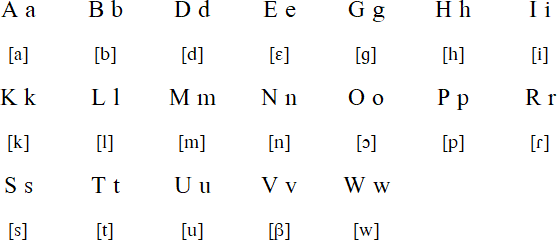Hiri Motu is spoken in Papua New Guinea, and is a simplified version of Motu, with influences from English, Tok Pisin and other languages spoken in Papua New Guinea. Motu is a member of the Western Oceanic branch of the Malayo-Polynesian language family. The word hiri refers to the trading voyages of the Motu people, and Hiri Motu developed as a way to communicate the people they traded with, who spoke other languages. It became a lingua franca in parts of Papua New Guinea, and was widely used up until the 1960s. Since then Tok Pisin and English have been more commonly used.
In 1992 there were about 120,000 speakers of Hiri Motu, mainly in the Central and Gulf provinces, especially around Port Moresby, and also in Milne Bay and Western provinces. Most are elderly and speak it as a second language.
Hiri Motu is also known as Police Motu, Pidgin Motu or Hiri. Before the New Guinea Police Force was unified in 1946, Hiri Motu was used by the Royal Papuan Constabulary - hence the name Police Motu. The name Hiri Motu was recommended for the language in the early 1970s at a conference held by the Department of Information and Extension Services.
There are two dialects of Hiri Motu: the Papuan or non-central dialect, which is the most widely spoken, and which became the standard for official publications from 1964; and the Austronesian or central dialect, which is closer to Motu in terms of grammar, pronunciation and vocabulary.

Download an alphabet chart for Hiri Motu (Excel)
‘Aiemai Tamana e, guba dekenai oi noho, oiemu ladana do ai hahelagaia. Oiemu Basileia do ia mai, oiemu ura gauna tanobada dekenai do ai karaia, guba dekenai idia karaia bamona. Hari dina aiemai aniani mani oi henia ai dekenai. Aiemai dika mani oi gwauatao, badina be ai dekenai idia hadikaia taudia edia dika ai gwauatao. Dibagani dika gabuna dekenai ai do oi hakaua vareai lasi, to Satani ena imana dekena amo do oi hamauria ai.
Source: https://ebible.org
Our Father which art in heaven, Hallowed be thy name. Thy kingdom come. Thy will be done in earth, as it is in heaven. Give us this day our daily bread. And forgive us our debts, as we forgive our debtors. And lead us not into temptation, but deliver us from evil: For thine is the kingdom, and the power, and the glory, for ever. Amen.
Source: https://www.kingjamesbibleonline.org/Matthew-Chapter-6/
Information about Hiri Motu | Tower of Babel
Information about Hiri Motu
https://en.wikipedia.org/wiki/Hiri_Motu
https://www.ethnologue.com/language/hmo
https://openresearch-repository.anu.edu.au/handle/1885/133561
Adzera, Ahamb, Äiwoo, Aneityum, Apma, Araki, Are, ’Auhelawa, Avava, Babatana, Bariai, Bola, Big Numbas, Buhutu, Bwaidoka, Caac, Cheke Holo, Dorig, Hiri Motu, Hiw, Hoava, Kakabai, Kaninuwa, Kokota, Kove, Kurti, Lakon, Lehali, Lenakel, Lewo, Lote, Lo-Toga, Löyöp, Manam, Marovo, Maskelynes, Mato, Mavea, Mono-Alu, Motu, Mussau-Emira, Mwotlap, Nafsan, Nahavaq, Namakura, Nanggu, Nduke, Neve‘ei, Neverver, Ninde, North Efate, Nume, Paamese, Papapana, Raga, Rotuman, Roviana, Sa, Sakao, Saliba, Siar, Sio, Ske, Sobei, Sursurunga, Tamambo, Tami, Teanu, Tigak, Tirax, Tolai, Touo, Ubir, Ughele, Uneapa, Vatlongos, Vitu, Vurës, Western Fijian, Yabem, Yapese
Languages written with the Latin alphabet
Page last modified: 31.10.22
[top]
You can support this site by Buying Me A Coffee, and if you like what you see on this page, you can use the buttons below to share it with people you know.

If you like this site and find it useful, you can support it by making a donation via PayPal or Patreon, or by contributing in other ways. Omniglot is how I make my living.
Note: all links on this site to Amazon.com, Amazon.co.uk
and Amazon.fr
are affiliate links. This means I earn a commission if you click on any of them and buy something. So by clicking on these links you can help to support this site.
[top]